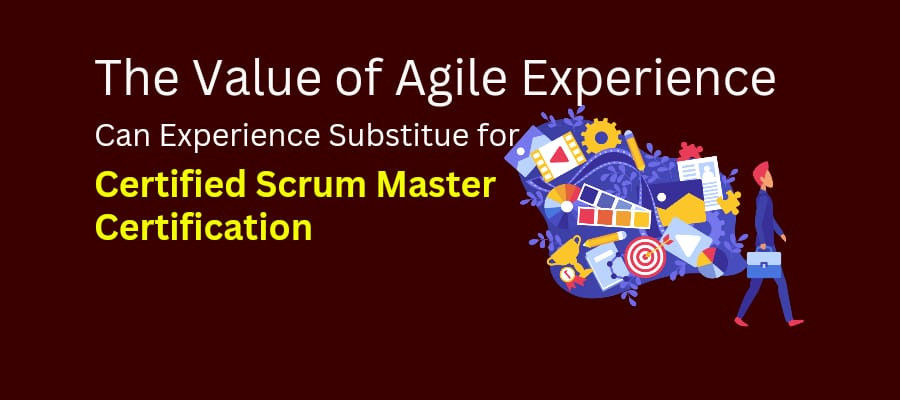The Value Of Agile Experience: Can Experience Substitute For CSM Certification?

Are you a seasoned professional with years of Agile experience yet wondering if a CSM certification is worth your time? Companies often seek out experienced Scrum Masters who can navigate the complexities of Agile projects with finesse. Henceforth, practical experience gives you the advantage of dealing with real-world problems when running an Agile Development Project.
However, even the most experienced Agile Practitioners can benefit from the formal recognition and structured knowledge that a CSM certification offers. So, can experience alone substitute for a CSM certification? Let’s explore how Agile experience and CSM certification can complement each other to help you stand out in this competitive job market!
Reviewing The Certified ScrumMaster (CSM) Certification Benefits:
The CSM certification, offered by Scrum Alliance, is a globally recognized credential that validates an individual's understanding of Scrum principles, practices, and roles. The certification process involves rigorous training and an examination that offers the following advantages to Agile Beginners:
- Structured Learning: CSM certification provides comprehensive courses conducted by certified trainers that cover all aspects of Scrum, including roles, events, and artifacts.
- Validation of Skills: Certification formalizes an individual's knowledge and skills, giving employers confidence in their abilities.
- Global Recognition: As a widely recognized credential, CSM certification enhances career opportunities and professional credibility in the worldwide job market.
You can pick a reputed CSM Training Provider like PremierAgile, which partners with Scrum Alliance to bring the best CSM courses you can enroll in! But, before that, let’s compare the CSM credentials with a professional’s Agile Experience!
Measuring The Value Of Having Agile Experience:
Practical experience in Agile environments is undeniably valuable. It provides hands-on exposure to real-world challenges, team dynamics, and the nuances of implementing Agile practices. Here are some key aspects where experience shines:
- Real-World Problem Solving: Experienced Agile practitioners have tackled real-world problems, finding practical solutions that may not be covered in textbooks or certification courses.
- Adaptability: Working in various Agile environments allows practitioners to adapt Scrum practices to different contexts, improving flexibility and resilience.
- Team Dynamics: Experience provides insights into team behavior, conflict resolution, and effective communication, which are crucial for a Scrum Master.
- Contextual Knowledge: Experience leads to a deeper understanding of organizational culture, stakeholder expectations, and project-specific challenges.
- Mentorship and Leadership: Seasoned Agile practitioners often mentor junior team members, sharing their knowledge and fostering a culture of continuous improvement.
However, if you have any prior Agile Experience, it’s best to enhance your skillset with the CSM credentials! Are you still not convinced? Let’s continue the discussion!
Agile Experience vs. CSM Certification: A Comparative Analysis
To give you peace of mind, we will compare both in various ways. You can simply follow this comparative analysis to keep your head straight and have a clear aim for your future career.
Knowledge and Skills
CSM Certification: Provides a standardized foundation of knowledge, ensuring a consistent understanding of Scrum across practitioners.
Experience: Offers a depth of practical knowledge, with insights gained from applying Scrum in diverse scenarios.
Credibility and Recognition
CSM Certification: Enhances credibility through formal recognition and validation of skills.
Experience: While valuable, it may vary in recognition depending on the organization and specific experiences.
Career Opportunities
CSM Certification: Opens doors to global career opportunities, with many employers requiring or preferring certified professionals.
Experience: Demonstrates capability but may require additional validation, such as references or project portfolios.
Finally, Balancing CSM Certification With Agile Experience:
While both Agile experience and CSM certification have their merits, the most effective Scrum Masters often combine both. Here’s how you can balance accreditation and expertise to maximize your potential:
- Start with Certification: For those new to Agile, starting with a CSM certification provides a strong foundation. It equips you with the knowledge and skills to confidently begin your Agile journey. The structured training helps you understand the core principles and practices of Scrum.
- Gain Practical Experience: Gaining practical experience is crucial after obtaining certification. Apply your knowledge to real-world projects and face the challenges of Agile Implementation.
- Pursue Advanced Certifications: For experienced practitioners, pursuing advanced certifications like Advanced Certified ScrumMaster (A-CSM) or Certified Scrum Professional ScrumMaster (CSP-SM) can further validate and expand your expertise. These certifications build on foundational knowledge and require demonstrable experience, ensuring you continue to grow professionally.
Whether you are an Agile Beginner or a seasoned Agile Practitioner, investing in the CSM certification and gaining Agile experience will only help you shine! So, keep learning and growing!
Reference:
Certified ScrumMaster (CSM) Certification - Scrum Alliance
Professional Scrum Master™ I Certification | Scrum.org



